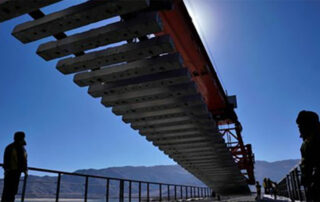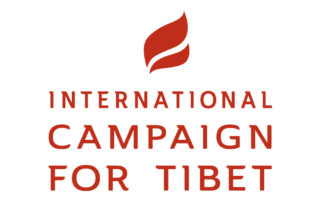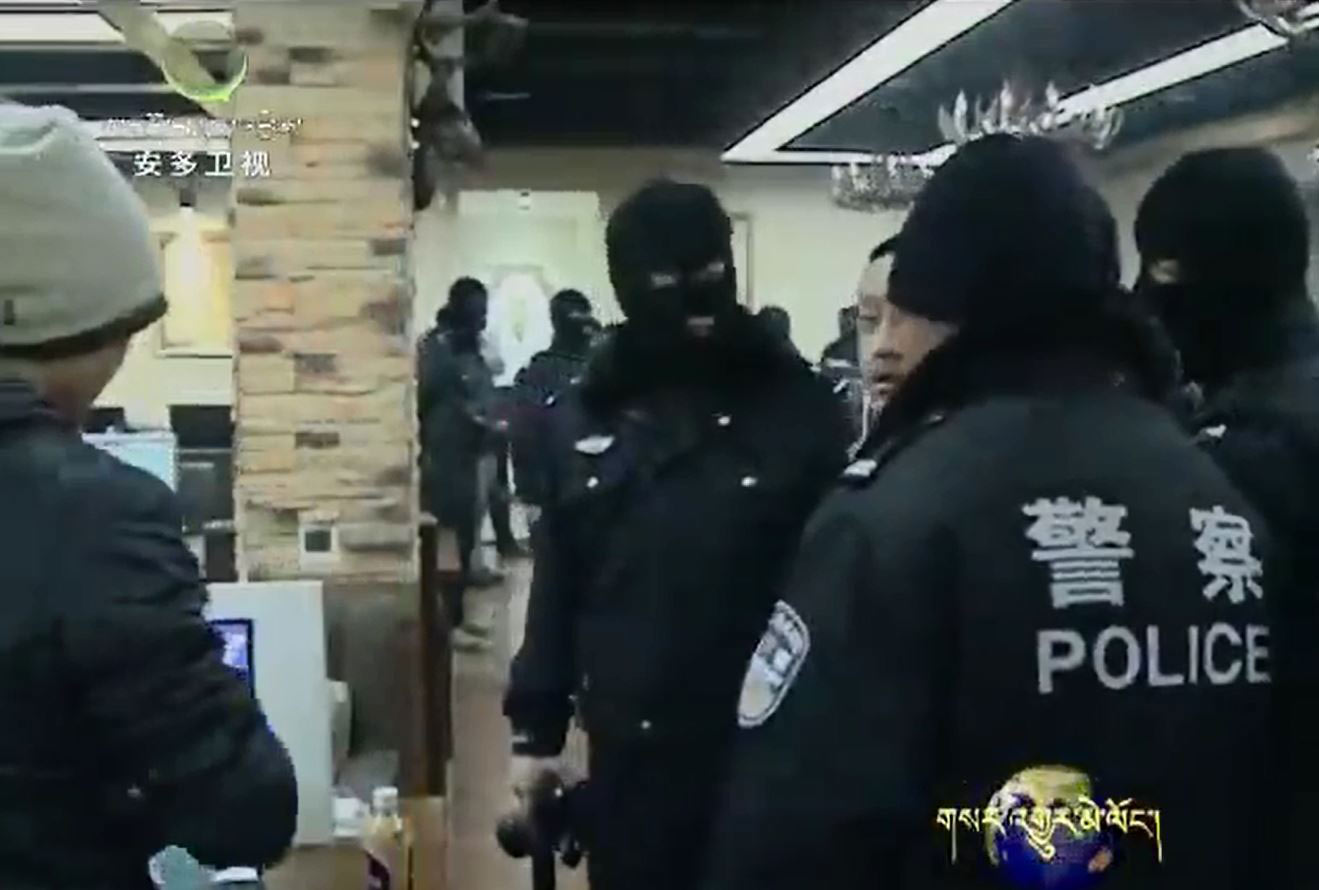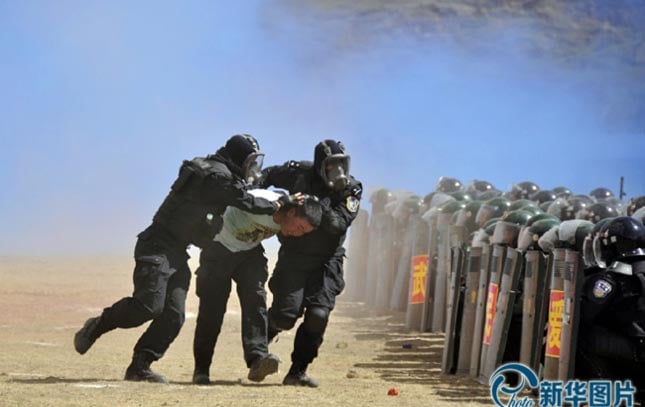Tibetans ordered to prostrate to pictures of Chinese President as Tibet leaders prioritize anti-Dalai Lama stance
January 15, 2019
As the authorities in Tibet Autonomous Region (TAR) emphasized their “clear-cut” stance against the Dalai Lama at meetings of the Region’s Party Congress last week, news emerged from eastern Tibet that Tibetans are being told to prostrate and make offerings to pictures not of Buddhist icons, but of Xi Jinping.
China’s control state in Lhasa 2
CHINA’S CONTROL STATE IN LHASA THE BLACK BOX OF TIBET’S PRISON SYSTEM: DETENTION CENTER NOTORIOUS FOR TORTURE NEXT TO 5-STAR GLOBAL [...]
China’s control state in Lhasa
CHINA'S CONTROL STATE IN LHASA: THE BLACK BOX OF TIBET’S PRISON SYSTEM
Satellite images show how China has remade Tibet’s capital as a hub of hyper-security while increasing tourism at the same time.
China identifies new ‘terrorist crimes’ strengthening legal stranglehold on Tibetans
June 26, 2018
China has identified “new crimes of terrorism” in a further escalation of oppressive measures that are focused less on protecting China’s citizens and more on the elimination of dissent and enforcement of compliance to Communist Party policies.
Xi Jinping cements grip on power at Party Congress: new leaders revealed and their influence on Tibet policy
November 1, 2017
- China’s 19th Party Congress came to a close last week, revealing a new leadership committee and breaking with tradition by not including a clear successor to Party Secretary and President Xi Jinping. The new configuration cements Xi Jinping’s grip on power for the next five years and potentially beyond, with Xi’s ideology approved for incorporation into the Party Constitution as ‘Xi Jinping thought’.
- In his marathon three and a half hour work report to the Party Congress, Xi Jinping underlined his determination not to allow “to separate any part of Chinese territory from China”, a political term linked to the crushing of dissent and enforcement of compliance to Party rule.
- Among the new figures on China’s top Politburo Standing Committee, the seven leaders who now govern China, is an official who served in a Tibetan area, Zhao Leji, and was active in the “political struggle against the Dalai Lama”, according to the state media. Another among the seven, Wang Huning, has maintained a close involvement with Tibet and is also likely to be extremely influential on policy.
New developments in China’s Tibet policy as Communist Party’s 19th Congress begins
October 17, 2017
- Since Xi Jinping assumed power at the last Party Congress in 2012, there have been significant developments in China’s Tibet policy, reflecting its prominence to the Communist Party leadership as an issue that is integral to China’s territorial concerns, the future of China’s economic expansion and the legitimacy of the CCP itself.
- China has dramatically tightened control in Tibet in advance of the 19th Party Congress in Beijing from October 18. Massed ranks of troops and special forces gathered in Lhasa and other cities in the Tibet Autonomous Region for intimidating military drills in which soldiers swore allegiance to “protecting the 19th Party Congress”. Despite the already oppressive measures in place, the leadership in Tibet has emphasized even stricter ‘rectification’ with grassroots Party organisations warned to be even more “effective battle fortresses”.
- The Tibet Autonomous Region (TAR) has been closed to foreigners during the Party Congress. Tibetans have been further isolated from the outside world due to more systematic blocking of communications, creating dangers even in innocent family conversations in the buildup to the meeting in Beijing, and are being subjected to more intrusive ideological campaigns.
Security crackdown follows first Tibetan self-immolation in 2017
March 28, 2017
- Security has been intensified in an area of Kardze (Chinese: Ganzi) where a 24-year old Tibetan farmer, Pema Gyaltsen, set fire to himself on March 18 near a monastery.
- A video has emerged from another area in Kardze, Serthar (Chinese: Seda), which appears to show Tibetan pedestrians in traditional clothes being attacked and brutally beaten by police. A voice over removed from the video footage, circulated by Voice of America, reflects shock and sadness among onlookers, with one voice saying over and over again, “They are doing this for no reason at all.”
- Tensions are high in the Serthar area, which is close to the religious institute of Larung Gar, also in Kardze Tibetan Autonomous Prefecture in Sichuan, the Tibetan area of Kham. Images and video of more demolitions at the religious institute over the last few days are circulating on social media.
Tibet locked down and travellers banned during sensitive anniversary
Joint statement by The International Federation for Human Rights (FIDH) and International Campaign for Tibet (ICT)
January 27, 2017
Tour operators have announced the closure of the Tibet Autonomous Region (TAR) to tourists again next month, coinciding with the anniversary of the Tibetan Uprising in March 1959 and the related protests across Tibet in March 2008.
ICT’s President, Matteo Mecacci said: “This lockdown, taking place in an already restrictive political climate, has been imposed every year since 2008 but must not be accepted as ‘business as usual’. Chinese tourists travel in their millions across the world but foreigners are barred from seeing Tibet for themselves because of the Chinese Party’s counter-productive hardline security measures on the plateau. Foreign countries must call on China to abide to the principle of “reciprocity” and to stop limiting foreign and independent access to Tibet. This is unjustifiable and must be condemned.”
Inside Tibet: Rare admission of psychological impact on troops involved in counter-terror, oppressive policies
December 5, 2016
A rare admission of psychological problems among police officers involved in implementing oppressive policies in the PRC, including trauma linked to the imposition of ‘stability maintenance’ and counter-terror policies, is made in a document obtained by ICT and published by a People’s Armed Police University College.
The document, published by the Department of Military Psychology at the college in Xian earlier this year,[1] expresses alarm at the dangers of long-term trauma, debilitating fear and anxiety and combat shock that arise from the policies of ‘stability maintenance’, which has involved the dramatic expansion of the powers of military and police in both Tibet and Xinjiang backed by grass roots propaganda work and electronic surveillance. “Studies have shown that during the normal carrying out of anti-terror and stability maintenance duties, psychological problems readily arise among officers,” the paper states, adding: “There is cruelty in the anti-terror struggle.”[2]
Lockdown of Tibet: closure to foreigners deepens isolation
February 25, 2016
Joint statement by International Federation for Human Rights (FIDH) and International Campaign for Tibet (ICT)
Ahead of the March 10 anniversary of the Tibetan Uprising of 1959, the Tibet Autonomous Region (TAR) will be closed to visitors from today until the end of March, with all foreigners being instructed to leave by February 25. FIDH and its member organisation International Campaign for Tibet codemn this annual process of sealing off Tibet from the outside world.
Authorities are said to be issuing notices to all major cities and counties that all foreign visitors must leave the region by today’s deadline.
Tightening of an invisible net: new security measures in eastern Tibet heighten surveillance, control
February 16, 2016
New systematic and long-term security measures are being rolled out in the eastern Tibetan areas of Kham and Amdo as part of an intensified control agenda set at the highest levels in Beijing and in line with a ‘counter-terror’ campaign.
“It has gone beyond a simple ‘crackdown’ now, and is much more sophisticated, and terrifying,” a Tibetan source told ICT after speaking to a number of Tibetans from different parts of Tibet. “Security is invisible and everywhere. It is no longer only armed police patrolling the streets; often we don’t know who the police are as they blend into society, and officials are in our homes, asking about every part of our lives.”
China’s first counter-terror law and its implications for Tibet
January 7, 2016
China has passed its first counter-terror law, rejecting concerns from international governments that draconian measures in the name of national security are being used to crack down on Tibetans, Uyghurs and Chinese civil society and to undermine religious freedom.
The new law, which will form the blueprint for China’s counter-terrorism strategy, was passed on December 27 (2015)[1] and follows the imposition of oppressive and counter-productive policies in Tibet and Xinjiang, involving extra-judicial killings, torture and imprisonment, and crackdowns on even mild expressions of religious identity and culture. An aggressive ‘counter-terrorism’ drive in Tibet with a strongly political dimension has involved an expansion of militarization across the plateau despite the absence of any violent insurgency in Tibet.[2]
Alarm at repressive new laws in China on counter-terror, security and NGOs
June 3, 2015
Chinese draft laws on security, counter-terrorism and non-governmental organizations that move closer to implementation this week constitute a further and more serious threat to freedom of religion and expression and deepen repression in an already restrictive political climate. The new measures, which have caused alarm in the international community, broaden the reach of the Party state still further, contracting the space for civil society.
- Together with the National Security Law that is expected to be implemented this year, the proposed counter-terror law outlines a counter-terrorism structure with vast discretionary powers. The conflation of "terrorism" with religious "extremism" in the law gives scope for the penalization of almost any peaceful expressions of Tibetan identity, acts of non-violent dissent, or criticism of ethnic or religious policies. It also broadens the reach of the state into lay society, for instance requiring the strengthening of "counter-terrorism education" in schools.
- The draft security law will offer a programmatic and institutional framework for measures to protect "National Security". The proposal formulates goals and policies to promote "the leadership of the Chinese Communist Party" and to "maintain a socialist system with Chinese characteristics" and calls for "guarding against and lawfully punishing the exploitation of religion to conduct illegal and criminal activities", while maintaining "normal order of religious activities". Religious policy in the PRC is shaped by the ideology of the ruling Communist Party and its political imperative of maintaining power.





